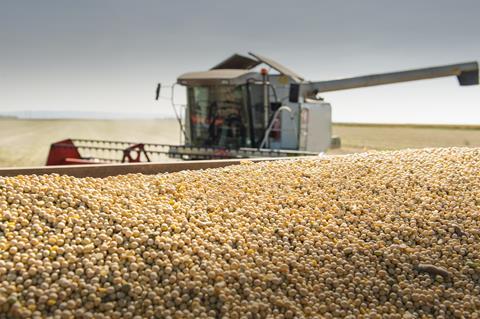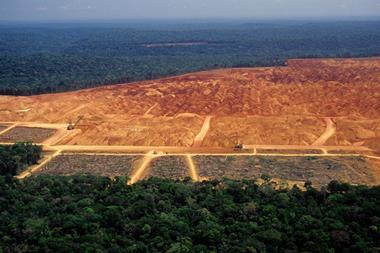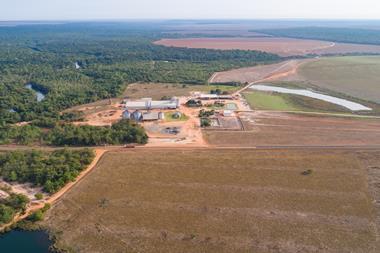
The publication of a new industry roadmap this month to stamp out deforestation by the Retail Soy Group – representing European supermarkets including Aldi, Asda, Co-op, Lidl, M&S, Morrisons, Sainsbury’s, Tesco and Waitrose – is a welcome indicator of change. If implemented, it could bring retailers a step closer to delinking meat sales in Europe from forest destruction in South America.
Industrial animal feed for chickens, pigs and cows has caused more deforestation through soy than any other commodity imported into the EU from 2005 to 2017.
The message from supermarkets, representing over £200bn in turnover and nearly 60 million UK customers a year, to businesses that are driving deforestation in South America is clear: clean up your businesses or face cut-off from the UK market within 14 months.
Supermarkets have immense power to influence markets through their sourcing strategy and commercial terms. As gatekeepers of global trade, they can shape production processes to deliver ‘just in time’ convenience for consumers to precise quality standards.
What the roadmap says:
The roadmap represents both an agreement on what good looks like in sourcing policy between retail giants and NGOs but also illustrates progress in several areas – moving away from certification towards concrete action:
- The roadmap emphasises the importance of placing soy sourcing strategy in a wider context, in which respect for human rights and ensuring community development are also critical components of sustainability.
- It articulates an agreement that supermarkets should move towards alternative proteins and reduce meat sales to cut demand for soy as a driver of deforestation.
- The agreement effectively sets a direction of travel away from the now discredited approaches to deforestation through certification or ‘credits’, which have been criticised for offering only ‘sparse, limited and often context-specific benefits’ and can allow destructive companies to continue business as usual.
- Most importantly, implementing supermarkets have agreed to impose a so-called retrospective cut-off date of August 2020, after which they will not accept embedded soy from legal or illegal conversion of forests and native ecosystems in their products. They have also agreed they will pass on these requirements to their direct and indirect suppliers while imposing clauses in supplier contracts.
- Critically, the roadmap signals these stipulations should apply at a group level for suppliers by 2023. This means that companies should not be able to provide ‘clean supply’ to one part of their supply chain while continuing to bulldoze land for others.
This all sounds very promising.
Until now, powerful Brazilian agribusiness companies have refused to accept any conditions in their purchasing of soy from farmers in deforestation hotspots such as the Cerrado – stating they will not accept a moratorium to contain expansion of the agriculture frontier, nor any requirements they consider to be above that of Brazilian law.
With an implementation period of 2023, the new roadmap has the potential to cut off Cargill and Bunge in Brazil from lucrative markets within 14 months if they don’t clean up their businesses.
However, our experience of working in palm oil in Indonesia – where deforestation has plummeted – shows commercial action backed up by robust monitoring remains critical to achieving success.
Three tests that will determine success:
Three main tests will therefore determine to what extent the Retail Soy Roadmap can lead to industry transformation and a similar impact to that seen in palm oil.
1. To what extent will companies impose these principles and sustainability conditions in contracts? Our experience shows that to be effective, sustainability conditions such as a cut-off date and stringent transparency requirements must be cascaded into supplier contracts. This is the key lever to achieve change and moves sustainability into the realm of company purchasing and compliance rather than CSR.
2. How will companies handle non-compliance? To be successful, implementers of this agreement need to be crystal clear that non-compliance with the cut-off date, transparency and group-level responsibility principles will result in commercial consequences – such as suspension of contracts or dropping of volumes from companies linked to deforestation. This will be easier to achieve with contractual clauses already in place.
3. Will companies get serious in their investment in alternative proteins to reduce meat consumption? The benefits of consuming less meat for human health, animal welfare, climate change and biodiversity is clear. Any genuine strategy from retailers that aims to end deforestation and conversion in their supply chain must have sensible measures in place to reduce the sales of meat in the first place. This will reduce pressure on land but also spur investment in alternative proteins.
This soy industry roadmap could represent a turning point in attempts to delink soy-driven deforestation from meat sales. However, these three tests will determine whether the roadmap represents a true transformation – or another industry commitment that lacks the teeth to make change happen where it is most needed.



















No comments yet